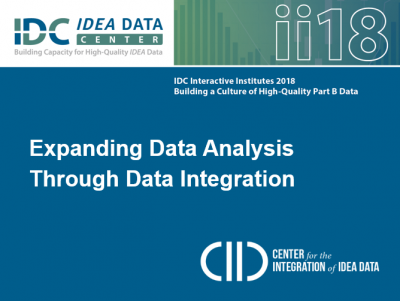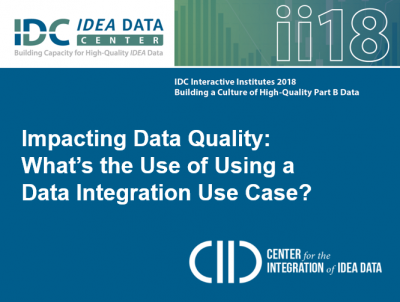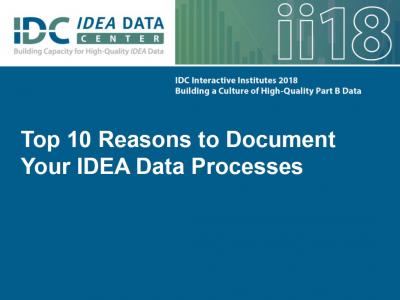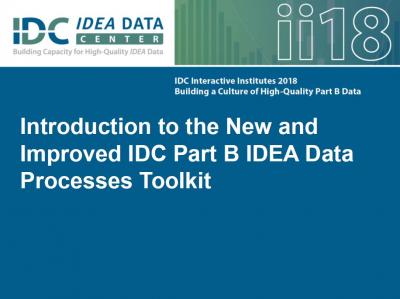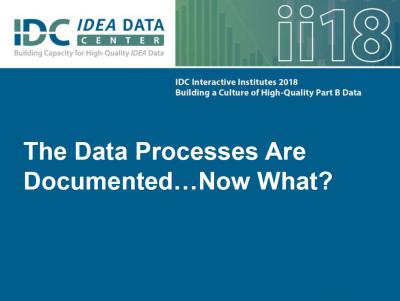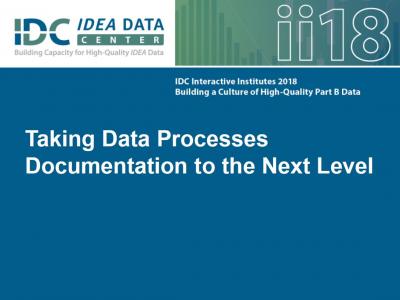Site Search
Results 134 - 140 of 158
Format: Presentations
Expanding Data Analysis Through Data IntegrationEducation data tell the stories of students through their school experience and beyond. Integrating IDEA data into a State Longitudinal Data System provides the ability to tell a seamless story of a student with disabilities. For an SEA, data integration breaks down data and agency silos, and data analysis across the K-12 spectrum becomes the norm. In this session, participants learned from TA providers about the richness of the data analysis possible and how using integrated data can offer a more accurate and compelling story of how students, teachers, and districts are achieving education goals.
Format: Presentations
Impacting Data Quality: What’s the Use of Using a Data Integration Use Case?Better data quality means better allocation of resources for students with disabilities. Participants learned firsthand how SEAs are using innovative tools and practices to improve data quality practices and procedures and how states can get involved in this meaningful work. Participants actively engaged in documenting the current state of their SEA’s data management practices and built a use case for IDEA data integration. They were able to see how CIID’s Generate tool is preparing 10 states for better data quality, more efficient reporting, and more effective data use through an integrated data system.
Format: Presentations
Developing Data LiteracyData literacy is a critical component of achieving and maintaining a culture of high-quality data and use. Working toward a high level of data literacy within an agency is an ongoing process that involves many steps and players. This session presented key considerations for improving data literacy, including how to develop and apply data to inform policy and practice and ensure that an agencies shares a meaningful story of the data with stakeholders that all can understand and use.
Format: Presentations
Top 10 Reasons to Document Your IDEA Data ProcessesThis session highlighted several benefits of documenting your state’s IDEA data processes. Developing a “playbook” (that describes the who, what, when, where, and how of your state’s process for collecting, validating, submitting, and reporting 616 and 618 data collections) memorializes those processes for your state and therefore helps build resiliency in your agency.
Format: Presentations
Introduction to the New and Improved IDC Part B IDEA Data Processes ToolkitThis workshop provided a brief overview of the new IDC IDEA Part B 616 Data Processes Toolkit. Several states that have piloted the toolkit shared their experiences with creating data processes for the SPP/APR indicators, building capacity of data stewards, and instilling a culture of high-quality data. Presenters facilitated discussion that helped participants understand the value of data processes documentation and afforded them an opportunity to experience preparing for and beginning this work.
Format: Presentations
The Data Processes Are Documented…Now What?Completing data documentation using IDC’s Part B IDEA Data Processes Toolkit provides many benefits to state agencies. After developing one or more of the protocols, state staff have seen firsthand the benefits of improved understanding of the data and communication about the data processes. This session provided a rationale for ongoing use of the data process protocols and how their use can help build capacity to create a culture of high-quality data at both the SEA and LEA levels.
Format: Presentations
Taking Data Processes Documentation to the Next LevelThis workshop provided participants an opportunity to envision and begin development of a comprehensive plan for creating protocols and follow-up activities they may use at both the SEA and LEA levels. Session activities focused on identifying appropriate roles to be represented at the table. They also focused on methods for engaging staff in the work and other critical considerations for implementing and sustaining these foundational data practices.

